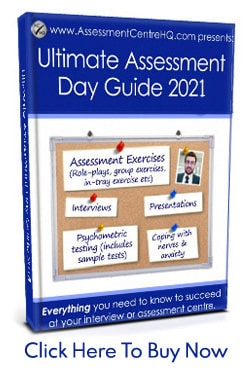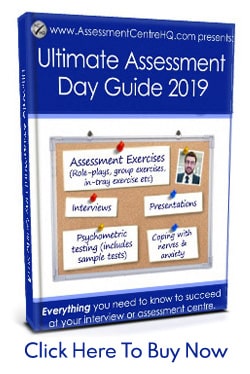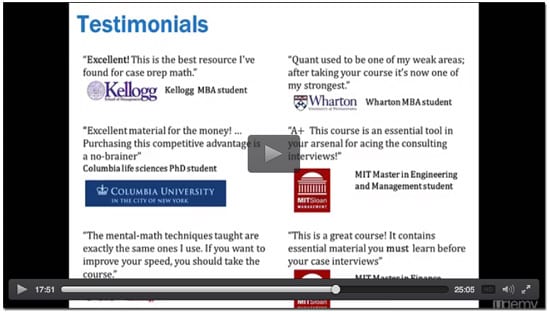How to Prepare for the KPMG Assessment Centre – 2024 Guide
This guide will tell you what to expect and how to succeed in gaining a position at KPMG, which is known to have a very strict recruitment process in the United Kingdom. If you are a student, graduate, or an experienced professional looking to pass the KPMG application process, this page is for you. Here you can learn how to ace the online assessments and successfully pass the assessment centre with flying colours.
One Important Point Before We Begin
- Note that different employers use different test suppliers. KPMG uses Cubiks tests. You can practice them here.
A Quick Overview of KPMG
KPMG is a multinational company. As one of the world’s largest organizations offering professional advisory, tax, and audit services, KPMG employs tens of thousands of staff and partners in the United Kingdom alone. KPMG provides guidance for clients by identifying growth opportunities, helping improve cash management, and assuring regulatory compliance.
KPMG is perceived as being a great company to work for, so competition is fierce. The company’s stated commitment to providing an environment in which people have the freedom to grow and reach their full potential continues to attract many applicants year after year. As such, the KPMG recruitment process is naturally tough to pass.
The path to employment at the company encompasses numerous steps, starting with a difficult online application. Even so, the most testing phase for many is the day spent at the KPMG assessment centre. This is the last step prior to an applicant’s final interview. Success at the KPMG assessment centre typically requires lots of preparation and study.
What Does KPMG Look for in a Candidate?
KPMG has a set of six core values that dictate the traits they look for in candidates. Make sure to familiarise yourself and memorise the following values to help you succeed in the application.
- Integrity – Doing what is right
- Excellence – Constantly learning and improving
- Courage – Acting with confidence and creating bold solutions
- Together – Working as a team and finding strength in our diversity
- For Better – Doing what matters
Prior to Attending the KPMG Assessment Centre
It is very important that you can demonstrate you have an interest in KPMG’s business, their clients, and the market they operate in. It is essential that you spend some time researching. Also, do not forget to dress the part. KPMG is a premium firm to work with. You need to look the part by wearing appropriate, business casual clothing.
Action point: Download KPMG’s annual report and spend an afternoon digesting it and making notes on the key points. (You can find it here.) Reference your findings in your interview. It will mark you out as someone with initiative, an eye for detail and good commercial acumen.
KPMG Assessment Tests
Candidates for employment face an intensive series of job tests, including those offered during the KPMG assessment centre assessment day, before reaching the final interview. The first two tests are taken online and you must score well on these if you are to have the opportunity to attend the KPMG assessment centre. (You can practice them here.)
You will have 20 minutes to complete each test. These online assessment tests are unlike the exercises you will encounter at the KPMG assessment centre itself. The first exam tests your numerical ability and the second one tests your verbal skills.
The numerical reasoning test consists of 24 questions covering six sets of data. You must analyse the data, which is presented in the form of percentages, graphs, and charts. There are four questions per data set. Each question presents you with five choices, and you must select the correct answer.
The verbal reasoning test presents you with texts containing a variety of facts. You must read each text carefully to understand the information. The test consists of 10 texts with four questions on each. The responses are formatted in the true, false, or cannot determine from the information style. Read our numerical reasoning and verbal reasoning guides to learn how to ace these tests.
What Happens if I Pass KPMG’s Online Tests?
If your scores on the online tests are sufficient, KPMG will arrange a telephone interview. These interviews normally take approximately 45 minutes. You will be asked to respond to both scenario-based questions as well as questions covering your skills. Be sure and incorporate the KPMG key competencies, but also make sure your answers do not violate the company’s core values. (You can practice telephone interviews here.)
If the telephone interview goes well, you will be invited to attend the KPMG assessment centre.
Action point: During your prep time be sure to read some KPMG case studies to get an idea of their work processes, aims, and even the language and terminology they use. Reflect this back at them during your assessment centre to impress them. You can find KPMG case studies here.
KPMG Assessment Centre Guidance Videos
You can also spend some time looking at GreenTurn’s youtube videos. They will prove extremely useful. Here’s an example:
(The first video in the KPMG series can be found here.)
About the KPMG Assessment Centre Assessment Day
If you are invited to the KPMG assessment centre for an immersive assessment, expect to spend the entire day participating in various exercises. Brace yourself. It will be a long and tough day! You can read our article How To Prepare For An Assessment Centre. It is one of our most popular posts and will help you ace the hiring process.
All exercises at the KPMG assessment centre will revolve around a fictional organization and its personnel. During the exercises at the KPMG assessment centre, you will be assessed on how well your abilities match the KPMG core values and key competencies.
The KPMG core values are the standards to which the company holds itself and its employees. Candidates attending the KPMG assessment centre are expected to demonstrate these traits. The company’s stated core values are:
• Leading by example
• Working as part of a team
• Acting with integrity
• Showing respect for the individual
• Being honest and open in communications
• Demonstrating a commitment to your community
• Seeking facts to provide insight
.
Stop worrying! Download a 12-step assessment day cheatsheet & be perfectly prepared.
Click here to download your copy

.
How Important Is This?
This is very important. Along with the core values, the key competencies are the traits and abilities that the company wants to see the KPMG employees. As such, candidates participating in activities at the KPMG assessment centre must exhibit them.
• Career motivation and resilience
• Demonstrated professional judgement
• Ability to include others and collaborate with them
• Continually striving for improvement
• Demonstrating curiosity and innovation
• Delivering quality work
• Seizing business opportunities that present themselves
• Demonstrating that you can have a positive impact
Although many factors determine your assessment scores, candidates attending the KPMG assessment centre who demonstrate the greatest number of key competencies and core values tend to receive the highest scores.
While the KPMG assessment centre exercises are challenging, they do give you a great opportunity to demonstrate how well you will fit with the company’s identity. Seize your chance and project these values and competencies at the assessors in spades.
KPMG Assessment Centre Virtual Office Exercise
The virtual office exercise you will undergo is designed to measure your prowess in making decisions under stress. This exercise becomes increasingly challenging because of the time constraints placed upon you. You will have only one hour to complete all tasks assigned in this KPMG assessment centre exercise. The tasks include memos, emails, and other communications and documents furnished to you by the KPMG assessment centre. (This is more commonly known as an “in-tray exercise” and you can find our in-tray success guide here.)
You must analyse every one of the items to determine how you will prioritize and handle each. Imagine that you have been on holiday and have recently returned to your office. You would no doubt find a great many messages awaiting you, and you must determine the order in which to deal with each.
This KPMG assessment centre exercise is designed to evaluate multiple skills. These include:
• How you interact with others
• Your basic intelligence
• Your efficiency and time-management skills
• Your management skills, such as delegating authority, prioritising tasks, assuming responsibility and general decision-making skills
• Your understanding of KPMG’s structure and culture
Sounds scary? Don’t worry, practise makes perfect.
You can practice the KPMG Virtual Office exercise here.
KPMG Assessment Centre Analysis Exercise
The KPMG assessment centre analysis exercise is also one hour in length. It requires you to gather a great deal of information quickly and then use the data to write an original report that should be 1,500 words long or approximately three typed pages.
In this exercise, the information given to you by the KPMG assessment centre all relates to one fictitious client. You must analyse the information to determine the client’s current problems. You must also determine what actions would help the client’s operation garner greater profits and operate more effectively. Your report must include the specific issues and your detailed recommendations, and you must complete the report at the KPMG assessment centre within the allotted time.
Remember, the KPMG assessors will be searching your report for evidence of the key competencies, so you want to be sure that your write-up demonstrates that you possess them.
KPMG Assessment Centre Role Playing Exercises
Role-play 1: The bulk of your day in the KPMG assessment centre will be spent on role-playing exercises. These exercises consist of two simulated meetings in which you must demonstrate the key competencies and core values of KPMG. The first meeting simulation at the KPMG assessment centre is between you and a client, and the second meeting is between you and your department manager.
In the first scenario presented by the KPMG assessment centre, you conducted business with the prospective client while you were with a previous employer. For some reason, the relationship soured and the client retains some negative feelings about you, at least according to the scenario presented. You must demonstrate your interpersonal skills to first rebuild a relationship with the client. You must convince the prospective client that your company and you are professional, have the solutions the client needs, and are the best choice for his needs.
Role-play 2: After your simulated meeting with the client, you move to the second KPMG assessment centre role-playing simulation. You will attend a meeting with an actor portraying your department manager. You must report the results you obtained in the meeting, but you must also detail what transpired and explain how you can move matters forward. This meeting is typically your last exercise at the KPMG assessment centre.
In both meeting simulations, you must make sure that none of your promises or solutions violate the core values of KPMG.
You can find our role-play success guide here.
After the KPMG Assessment Centre
Successful candidates at the KPMG ace the assessments and demonstrate all key competencies. If you manage to do this during the day you spent at the KPMG assessment centre, you should receive an invitation to return for an additional interview.
This in-depth interview typically lasts approximately one hour and is normally conducted by a partner or the director responsible for your area of expertise. Applicants for advisory positions may have to perform a presentation also. (Our presentation success guide is here.)
And Finally….The KPMG Interview
During the interview, you want to reinforce that you possess the key competencies desired by KPMG. Prior to the interview, study the list of key competencies and prepare sample interview answers that include them. Be prepared to answer a variety of questions about yourself, KPMG, and business in general.
The questions vary, but you can expect to be asked to state your career goals and explain why you want to work for KPMG. You may be asked to discuss a current event and its effect on businesses or the overall economy. The interviewer may ask you what you expect from KPMG while you are in training.
Before your interview, prepare by thinking about the types of questions you may be asked. (You can find a decent list here.) The exercises you completed at the KPMG assessment centre should have given you great insight into what to expect.
Mentally and verbally rehearse your answers. Make sure to include evidence of the key competencies. This interview is your final hurdle, but with proper preparation, you should be able to present yourself at your absolute best during the KPMG interview.
FastMaths – Case Study Interview Preparation
This Udemy course from Matthew Tambiah gets straight to the point. It teaches fast techniques to help candidates quickly solve the commercial problems posed in management consulting interviews and case studies. If you are seeking your dream job with companies like KPMG, PWC, or Deloitte, this one is for you.
The course has two components:
1) The first half of the course teaches techniques to perform numerical calculations quickly and efficiently without using a calculator or spreadsheet (as required in case interviews).
2) The second half of the course reviews the most common types of quantitative problems given in case study interviews. The course shows students the most efficient solution method for each problem type, and how to use the computational techniques taught in the first portion of the course to generate answers quickly and efficiently.
The course highlights how to use the results of the quantitative analysis to generate insights and recommendations relevant to the overall case.
All the example problems used in the course are derived from real case studies from leading management consulting firms including Deloitte, McKinsey, BCG, and Accenture.
More Articles of Ours That Will Help You
We have written tons of other articles that will help you succeed at your interview or assessment centre:
- Do you want to learn more about psychometric testing, personality questionnaires, numerical reasoning, and verbal reasoning?
- Maybe you are worried about performing during a group exercise, a presentation, role-play exercise or want to know how to properly prepare for an interview?
- One of our most popular posts is “How To Prepare For Your Interview Or Assessment Centre.” It is filled with tons of tried-and-tested advice and secret techniques to prepare you for the big day.
- Perhaps you would also like some guidance on how to deal with nerves & anxiety at your interview?
- Lastly, the Tools and Resources page is packed with useful equipment and a list of recommendations that will make your life easier.
Turbocharge your employability NOW
Get your copy of our Ultimate Assessment Day & Interview Guide here. It's packed with tips, tricks and insider-secrets to help you succeed.
.
© Copyright AssessmentCentreHQ - All Rights Reserved
.
Study Guides
FAQs
1. How Do I Prepare for KPMG Assessment Centre?
The best way to prepare for a KPMG assessment centre will vary depending on your individual strengths and weaknesses. However, some tips that may help you prepare include practising common assessment centre tasks such as problem-solving, interviewing, and group exercise, and studying the company’s values and culture.
2. How Do You Pass the KPMG Assessment?
The KPMG assessment is a series of tests that you must pass in order to be hired by the company. The tests include a written exam, a case study, and an interview. To prepare for the assessment, you should review the material in the KPMG training program and practise answering questions aloud. You should also be prepared to discuss your experience and skills in detail.
3. Is KPMG Online Assessment Hard?
KPMG assessment tests are challenging. Only 3 to 5% of those who apply to KPMG get hired. Most fail the aptitude psychometric test.
4. How Long Does KPMG Online Assessment Take?
Since the assessment is not timed, you can take as long as you wish to complete it. According to KPMG, it should take around 90 minutes, so make sure to not panic so you will be able to answer the exam better.
5. What Is KPMG Online Assessment Test?
KPMG’s Transforming Small Businesses online assessment evaluates you based on your ability to respond to scenarios. In addition to verbal and numerical reasoning abilities, situational judgment will be required. It will be untimed and can be taken at home.
















